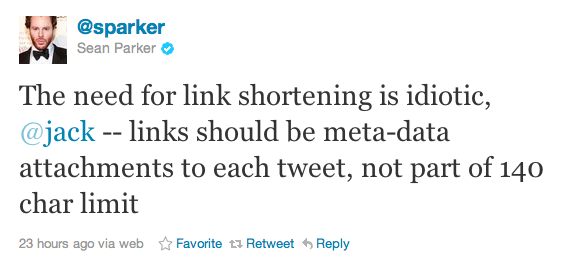Twitter, what happened to annotations?
Social network functionality is often in a state of flux with the public thought process not necessarily following through to a finished product or feature but is change always needed? The failure of annotations to see the light of day would suggest not.

Sean Parker's recent tweet to Jack Dorsey regarding link shortening and URLs in tweets highlights an interesting issue with Twitter and an obvious question: what happened to annotations?
Sean's statement that hyperlinks should be metadata and not part of the 140 character limit prompted MG Siegler to suggest this is another eureka moment akin to Sean's suggestion to Mark Zuckerberg that he lose the "The"; the implication is that this is such a simple and obvious change that could change Twitter immeasurably.
What of annotations?
We were granted a quick peek at the potential for client app developers to add metadata via "Twannotations" but then it all went quiet, why? We have the staple of location data attached to tweets but this seems to be about as far as Twitter has gone.
Functionality has instead been included via the website (auto-detecting certain image and video services to include items in the media pane) or client itself so why the move away from a very public demonstration of a, potentially, very powerful enhancement?
Simplicity
As previously discussed, CEO Dick Costolo has said that the Twitter experience should be the same across all means of access; talk of a more unified and simplified interface ensued. Since its acquisition TweetDeck has had to tow the company line and drop support for its long tweet platform Deck.ly in order to streamline this experience.
Twitter has already warned developers that making third-party clients is not the way it sees them boosting the ecosystem and this would, indeed tally with the company creating a standard means of using the service: "I shouldn’t have to think how to use Twitter" as Costolo said himself.
As annotations were to be open - allowing developers to define their own elements - there was potential for a confusing environment with no guarantee that one client would correctly interpret data from another. If Twitter is to focus on simplicity annotations do not fit this vision.
Since growing out of a text message based service Twitter has always stayed true to its SMS roots and talk of metadata brings us back to the ongoing argument regarding the reluctance to drop support for the format. SMS has no metadata so, unless links were delivered as a second message thus doubling cost, separating them from the body of a tweet is pointless. Arguing that this is another reason why SMS support should finally go is wrong especially when you consider that feature phone usage, and tweets sent via SMS, is expanding throughout the developing world.
Sorry Sean, link shortening within the body of a tweet looks like it's here to stay for the foreseeable future.

Sean Parker is a lot smarter than me, certainly, but I don't see how metadata would accomplish what Twitter is trying to do. I don't believe the main purpose of the t.co shortener is to stay within 140 characters, that is just the most visible result.
So far as I can tell, the main purpose is to track when the links are clicked even after they are forwarded out of the Tweetstream. Twitter can provide analytics to measure marketing effectiveness (and also show Twitter's value to marketers).
If the original URL were in the metadata, clients could go directly there without getting redirected through a Twitter service: no analytics.
Agreed but, conversely, there would be nothing preventing Twitter from adding the t.co address as the metadata item rather than the original. I still don't think they'd do it if the aim is to differentiate by making Twitter simple to use.
I have argued in the past that Google should also wrap URLs on Google+ using goo.gl and they too could combine their existing offering with the power of the social platform.
[...] Twitter, what happened to annotations? [...]
[...] this is Sean Parker who should be listened to, and his point is quite valid. A few days ago, Colin Walker talked about the problem, and reminded us of annotations: We were granted a quick peek at the potential for client app [...]
[...] this is Sean Parker who should be listened to, and his point is quite valid. A few days ago, Colin Walker talked about the problem, and reminded us of annotations: We were granted a quick peek at the potential for client app [...]